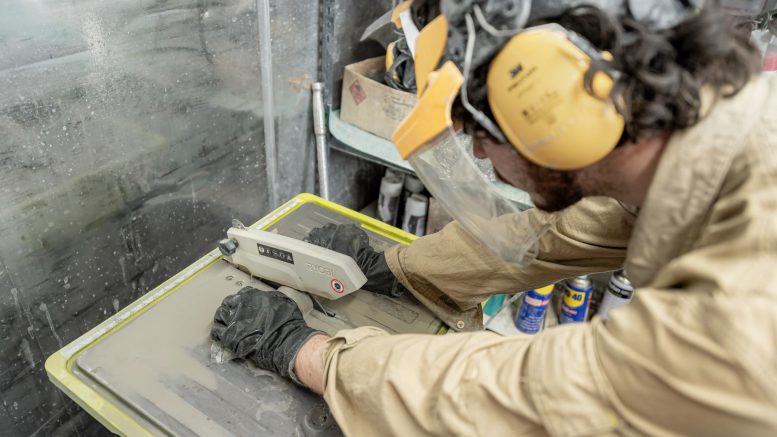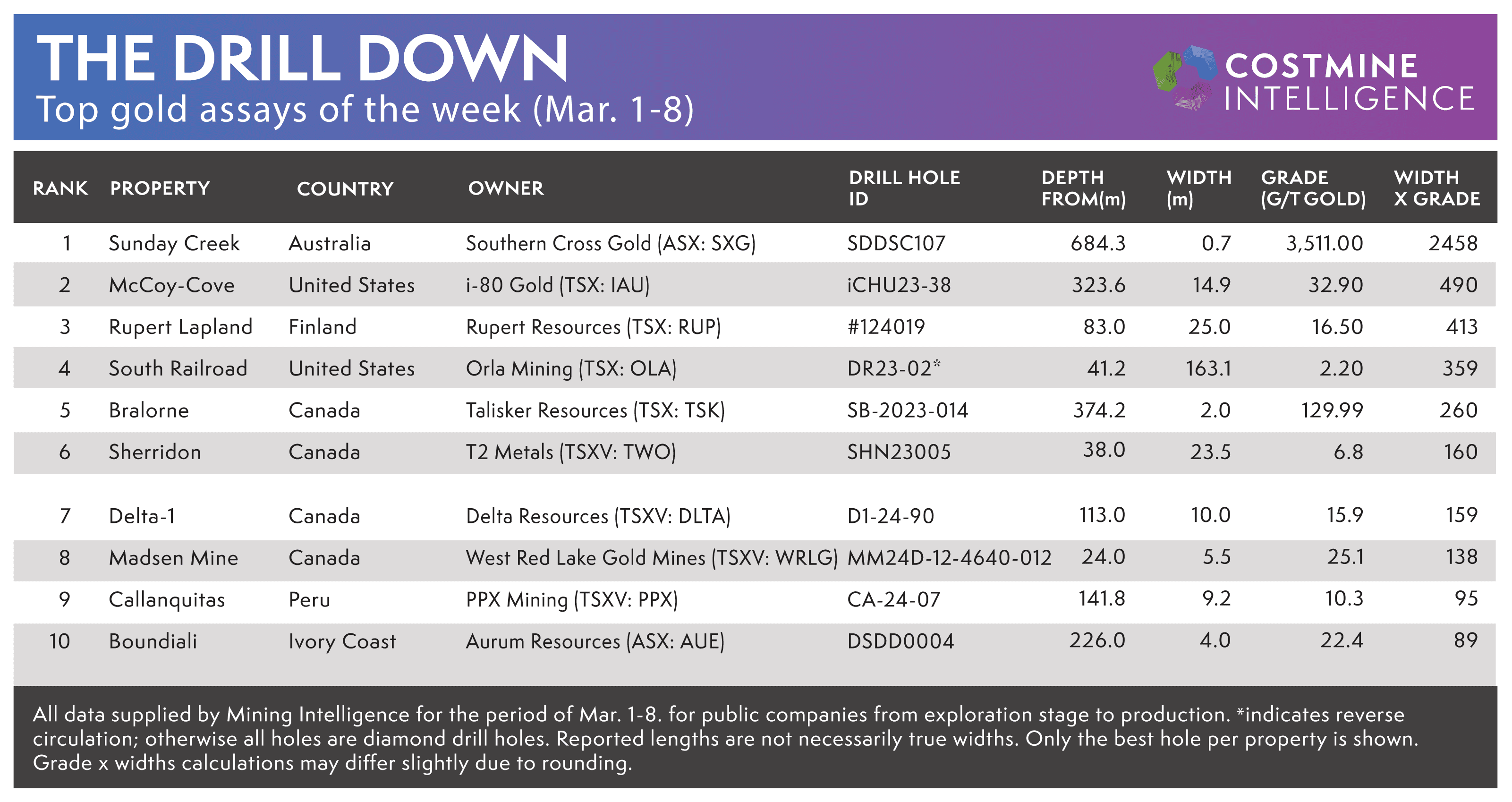*This article was originally written by Henry Lazenby and published in The Northern Miner
The Northern Miner’s Drill Down features highlights of the best gold assays from the March 1-8 period. Drill holes are ranked by gold grade x width as identified by data company Mining Intelligence.
The top three assay results come from three global regions – including Southern Cross Gold (ASX: SXG) leading the table with a bonanza find at its Sunday Creek project in Australia; followed by another strong result from i-80 Gold’s (TSX: IAU; NYSE: IAUX) McCoy-Cove project in Nevada; and Rupert Resources (TSX: RUP) also reporting encouraging intercepts from the Rupert Lapland project in Finland.
Sunday Creek in Victoria
On March 5, Southern Cross reported its best drill intercept yet at the Sunday Creek project, with hole SDDSC107 at the Rising Sun prospect cutting 0.7 metres at 3,511 grams gold per tonne from 684.3 metres depth for a width x grade value of 2,458. The first 0.3-metre section of the hole graded 7,330 grams gold.
Southern Cross managing director Michael Hudson says the hole has established the consistent presence of extremely high-grade mineralization for the first time, showing continuity with earlier results. This hole reached its highest grades 17 metres down-dip from another notable hole, SDDSC092, which had previously intersected a vein yielding 3.3 metres at 267.8 grams gold, including a segment of 0.4 metres at 1,610 grams gold in vein RS80.
“This provides an enticing opportunity to now focus on these ‘uber-high grade’ zones, in small but rich areas, with closer spaced drilling (including wedging) to rapidly build ounces beyond our initial exploration target,” Hudson said in the news release.
The company is undertaking expansion drilling with four rigs to drill 19,000 metres spread across several Sunday Creek targets, such as Apollo, Rising Sun, Golden Dyke and Christina, between last September and next month, with 10 holes being processed or in progress.
The drill program at Sunday Creek is targeting extensive vein formations across a 1,350-metre strike, revealing over 45 high-grade ‘rungs’ across a metamorphosed interbedded turbidite sequence, representing a potentially substantial mineralized system.
The project, located 60 km north of Melbourne within 193.65 sq. km of exploration tenements, closely resembles other global high-grade gold discoveries at this stage of development, with notable geological features inside the Melbourne Structural Zone.
McCoy-Cove in Nevada
i-80 Gold on March 5 reported the best drill intercepts to date at its McCoy-Cove project in Ladner Country, with hole iCHU23-38 returning 14.9 metres grading 32.9 grams gold from 323.6 metres depth for a width x grade value of 490.
The results are from drilling last year in the Helen Zone – the first horizon expected to be accessed at the Cove mine – including some of the best results yet from the underground drilling program. The company reports the program confirmed high‑grade mineralization over significant thickness, including many lenses in some parts of the deposit, and it compares favourably with initial results from the Gap Zone.
The McCoy-Cove property, located in Nevada’s Battle Mountain Trend close to the Phoenix Mine and near the Lone Tree facility, aims to be one of the top U.S. producers. i-80 plans an extensive 40,000-metre underground program at the Cove targeting the CSD Gap and Helen Zones to better understrand the resource. It also recognizes the untapped potential in the Cove South Deep and 2201 zones, all within a geological setting characterized by Carlin-style mineralization influenced by structural and lithological controls.
McCoy-Cove hosts 263.1 million indicated and measured tonnes grading 0.76 grams gold for 6.5 million oz. of metal.
Rupert Lapland in Finland
Ranking third this week is Rupert Resources, whose hole #124019 at the Rupert Lapland project in Finland cut 25 metres grading 16.5 grams gold from 83 metres depth, for a width x grade value of 413.
The results are follow-up assays from its Heinä South satellite target (1 km from Ikkari) and confirm evidence of broader mineralized zones than previously seen at Heinä South, the company reported on March 5.
New assays from drilling at Ikkari further demonstrate that mineralization remains open down plunge to the west with both broad and high-grade intercepts achieved.
Initial results from #124019 confirm continuous high-grade mineralization at Heinä South, along with Ikkari’s extensional drilling, is central to Rupert’s winter campaign.
Rupert reported an updated Ikkari indicated resource of 58.4 million tonnes grading 2.18 grams gold for 4.09 million oz. of metal.
The company will also explore potential satellite deposits around the Ikkari deposit and continue project engineering and permitting.






















